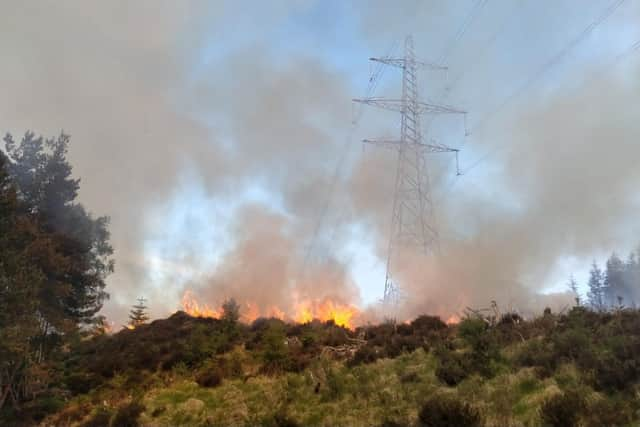Climate change: Net-zero drive is good for the planet and the economy so all political parties should commit to stopping new oil and gas projects in UK – Emily Shuckburgh, David Reay and Gabriele Hegerl
The greatest threat to our economy, to jobs, to living standards, and indeed to our security comes from climate change, and the greatest opportunity to grow a prosperous, safe and sustainable future comes from our response to that threat.
In Glasgow in November 2021, at the COP26 summit, global governments expressed “alarm and utmost concern” at the devastating toll climate change was already reaping around the world, and united behind a call for “accelerated action in this critical decade”. Earlier this year, the Intergovernmental Panel on Climate Change (IPCC) produced its latest synthesis report with the sober but devasting warning that there is a rapidly closing window of opportunity to secure a sustainable and liveable future for all.
Advertisement
Hide AdAdvertisement
Hide AdFollowing that, as climate scientists we wrote to the Prime Minister, together with 700 of our colleagues, calling for a commitment not to approve any new development of onshore or offshore oil and gas fields. The recent pledge by Labour to not allow any new domestic oil and gas developments and instead to invest heavily in renewable sources is welcome. But all political parties should make this commitment, in line with the long history of cross-party consensus that has marked the UK, and Scotland in particular, as an international leader on climate action.
Our way of life is at risk. The sweltering temperatures across the UK last summer and the recent wildfires that have raged in the Highlands provide a clear reminder of the direct threat posed by climate change.
Some 3.6 billion people – almost half the global population – live in climate change hotspots. Nine out of every ten of the world’s refugees are from vulnerable countries where changes in climate have had devastating social and economic impacts. Heat, drought, water and food shortages can drive migration, exacerbate unrest, and play a role in the outbreak of war. Climate change further amplifies existing threats to UK national security.
The IPCC report stated clearly that if the world is to limit the worst impacts of climate change, it will need to make rapid and deep and, in most cases, immediate cuts in greenhouse gas emissions in all sectors this decade, with carbon dioxide emissions reaching net zero by 2050.
The report provided a grave warning of the dangers of continued expansion of exploitation of coal, oil and gas reserves and concluded that the projected carbon dioxide emissions from existing fossil fuel infrastructure, without additional abatement, would be sufficient to exceed the remaining emissions budget that would limit warming to 1.5C – the warming level that global governments reconfirmed in Glasgow that they would do their utmost to keep within.


The world has already breached 1C of warming. Last month, the World Meteorological Organisation warned that at least one of the next five years is likely to temporarily exceed 1.5C of warming. That is an important alarm bell for a longer term breaching of the 1.5C limit that could follow soon after. It is not too late. But the conclusion is clear: we must change course, immediately.
It is sometimes claimed that stopping new developments of oil and gas fields would undermine energy security and lead to higher bills, but this is not true. As set out in the recent Independent Review of Net Zero by Chris Skidmore MP, there is now overwhelming evidence that the UK is far better served by a rapid transition to domestic clean energy sources, particularly renewables, and decarbonisation of our economy. With fossil fuel-related air pollution estimated to be responsible for one in five deaths worldwide, this would also have great health benefits.
Effective and low-cost alternatives to fossil fuels exist. If the UK had moved more quickly in this direction in the past, it would not have been so exposed to the energy and cost-of-living crises caused by interruptions in supplies of fossil fuels following Russia’s invasion of Ukraine.
Advertisement
Hide AdAdvertisement
Hide AdCompanies leading the way on net zero are now contributing more than £70 billion to the UK economy, more than twice that of the energy sector itself. Numerous analyses show that investments in a net-zero economy will generate jobs and growth across the UK.
This is particularly true in Scotland, which is creating a higher proportion of new green jobs than any other part of the UK, with such roles more than doubling last year. Scotland benefited greatly as a leader in the fossil fuel industrial revolution; it can now benefit as a leader in the green industrial revolution.
Clearly a green transition in the economy will mean a career transition for some. That means it is important to ensure there is support for skills development, training and retraining. The opportunities of a green future must be distributed fairly. The transition must be a just one.
Our windy isles provide a rich resource for a domestic renewable energy future. Our creative talent in academic institutions and industry provide a rich resource of innovation – from developments in battery technology to digital solutions, sustainable agriculture, green materials and more – to transform all sectors of the global economy. The evidence is overwhelming that our net-zero ambitions are good for lives and livelihoods.
Gabriele Hegerl is professor of climate system science at the University of Edinburgh; Emily Shuckburgh is professor of environmental data science at the University of Cambridge and director of Cambridge Zero, the university's major climate change initiative; Professor David Reay is chair in carbon management and education at the University of Edinburgh and executive director of the Edinburgh Climate Change Institute
Comments
Want to join the conversation? Please or to comment on this article.